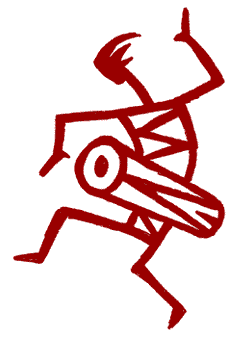

Thought of the Week Archives |
 |

|
|
|
March 25, 2002 A.I. - The Pure Love of a Child Saturday, March 23 was my mother's birthday. She passed away in 1987. Mom was a very sweet woman, and was loving in her own way. Due to her own internal struggles, however, she was not very physically affectionate. As a little boy, I tried to be perfect for her so that she would love me the way I needed. I carried that search for my mother's love into adulthood and made a mess of my life. Only with primal work did I awake from that heart-wrenching dream. On Saturday night, I watched the Steven Spielberg movie A.I. In spite of mixed reviews and limited success, it was highly recommended by a few primal friends of mine. It's about David, a robotic child in search of his beloved mother. I cried like a baby. Reviewers are saying that Haley Joel Osment's portrayal of David was unrealistic and too intense. Not so. I felt that intense need when I was little. My kids felt it when they were little. It is the power of true bonding, love and attachment. Remove any mammal baby from its mother and they squeal frantically. That frantic life-and-death pain comes across in the movie. This is a film initiated by Stanley Kubrick and completed by Steven Spielberg. Whether or not they were consciously aware of it, this film is about one thing - the pure love of children for their mothers. The story shows how necessary love is to a child, and how that love and need of love lasts on and on in a never-ending hope of fulfillment. This film is being called a modern fairy tale, the futuristic science fiction adventures of a robot boy. It is much more than that. It is a cautionary tale directed at the modern civilized family - in this era of daycare, divorce and Ritalin, children need to be loved, appreciated - and personally cared for. By using an artificial child, A.I. allows us to witness an "ideal" version of bonding and imprinting that we don't often see in our flawed, neurotic lives. The "real" humans in the film were certainly proof of that. Some reviewers say that the film failed to move them because, after all, David was still just a piece of machinery. But are the images of human actors projected on a flat movie screen any more human? No. Our pulses race and our tears flow because movies, as symbolic art, resonate with our human feelings of hope, fear, anger, longing, love, and need. David was supposed to be artificial, but his struggle was the struggle of almost every human child. The fact that he had to take on the impossible task of "becoming human" to win his mother's love brutally emphasized the impossible chasm that children have to cross in order to win the love of their emotionally unavailable parents. The Hopeless Struggle - Primal Theory 101. In primal work, one of the biggest moments is facing the fact that Mom was never there for us the way we needed her - and will never be. The struggle is over. We have lost. That window of opportunity is closed. When those feelings are still unresolved, seeing real love in our adult partner's eyes - or the depiction of it by a character in a movie - will take us to the brink of our pain. To avoid it we will side-step intimacy or say, "it's just a robot in a movie." In A.I., the scene that moved me most was David's one-day reunion with his Mother. The timeless, cosmic nature of the pure love of a united mother and child brought up the memories of my own dear mother and how much I adored her. It also painfully defined for me again what my body needed so much, but never got. It all seems so simple and self-evident. Children just want to be close, want to be loved, and want to feel special in their mother's eyes. Why is that so much to ask? Why does it have to be so hard? Why can't we wake up and give our precious children the simple love they so deserve? To wake up, we have to sense everything we are - including hidden, painful feelings. That's what primal work is all about. Wake up to love. It's not artificial. |